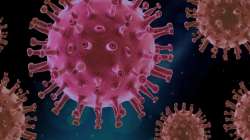Coronavirus mutation may have made it more contagious: Study
The virus that causes Covid-19 is accumulating genetic mutations, one of which may have made it more contagious, says a study involving more than 5,000 patients in the US.

The virus that causes Covid-19 is accumulating genetic mutations, one of which may have made it more contagious, says a study involving more than 5,000 patients in the US.
That mutation, called D614G, is located in the spike protein that pries open our cells for viral entry, according to the paper published in the peer-reviewed journal mBIO.
The patients involved in this study of SARS-CoV-2 genome sequences were from Houston, Texas.
The paper shows "the virus is mutating due to a combination of neutral drift-which just means random genetic changes that don't help or hurt the virus-and pressure from our immune systems," said Ilya Finkelstein, Associate Professor at The University of Texas at Austin and co-author of the study.
During the initial wave of the pandemic, 71 per cent of the novel coronaviruses identified in patients in Houston had this mutation.
When the second wave of the outbreak hit Houston during the summer, this variant had leaped to 99.9 per cent prevalence, said the study, adding that this mirrors a trend observed around the world.
A study published in July based on more than 28,000 genome sequences found that variants carrying the D614G mutation became the globally dominant form of SARS-CoV-2 in about a month.
SARS-CoV-2 is the coronavirus that causes Covid-19.
The good news is that this mutation is rare and does not appear to make the disease more severe for infected patients.
"The virus continues to mutate as it rips through the world," Finkelstein said.
"Real-time surveillance efforts like our study will ensure that global vaccines and therapeutics are always one step ahead."
The scientists noted a total of 285 mutations across thousands of infections, although most do not appear to have a significant effect on how severe the disease is.